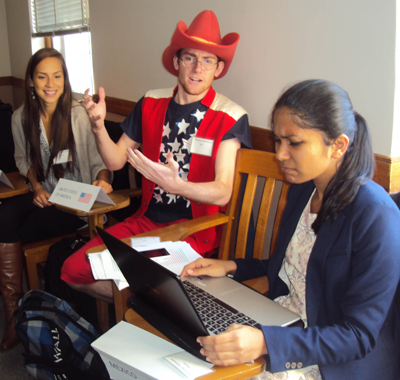Classroom Treaty Talks Speak Volumes on Climate Politics

UC Berkeley announced recently that it had reduced its carbon emissions to 1990 levels two years earlier than expected, showing how quickly progress can be made — at least at the local level — in addressing climate change. Unfortunately, getting the world community to take significant action has proven far trickier, and a recent exercise in a Berkeley class demonstrates why.
Kate O’Neill, an associate professor in the Department of Environmental Science, Policy, and Management, has been teaching international environmental politics since 1999. This year, she decided to make a simulated international climate-change conference the centerpiece of her fall course. Each of her 125 students was assigned one of 26 nations, chosen to represent a range of political and economic interests, from superpowers to some of the world’s smallest, poorest countries. The students then spent the semester studying and writing about their assigned nation’s population, economy, politics and vulnerability to climate change.
All that preparation was put to use last month, when the students were divided into four groups, each of which held its own mock treaty negotiations.
“It gave them a chance to really understand why it’s so difficult for countries to agree on climate change and what to do about it,” O’Neill says. “Plus it’s much more fun than having to write a long final essay.”
“It took the core concepts of the course and really made the students play them out,” adds one of O’Neill’s graduate-student instructors, Manisha Anantharaman, who served as moderator for one of the negotiation groups. “I think that’s really going to help them internalize what Kate’s been talking about this semester.”
There were opening addresses, motions, votes, impromptu coalitions and factions, impassioned pleas for action — and even those old political standbys, grandstanding and backpedaling. All of which was also on display thousands of miles away in Warsaw, where the real United Nations was simultaneously hosting its own global summit on climate change.
Not only did that conference fail to generate any real breakthroughs, it was more notable for its disappointments. Japan announced it was downgrading its emission-reduction goals significantly due to the near-meltdown at Fukushima in 2011, which forced the country to begin importing more coal and natural gas. Australia and China also seemed to back away from emission-reduction commitments, and both a bloc of developing nations and a group of non-governmental organizations walked out of the conference in protest.
Trust, but empathize
Junior Reza Abedi says his experience at O’Neill’s simulation helped him understand why such setbacks happen.
“This class was my first exposure to the politics side of energy issues, and it really opened my eyes to the institutional problems of addressing climate change,” says the economics major. “I think what I came out with more than anything is an understanding of why we don’t see the negotiating outcomes we would hope for. I don’t think there’s enough trust between countries to uphold their promises to take action.”
As society and environment major Elizabeth Kent saw it, trust wasn’t the only critical factor. Her team, which represented the European Union, found that a mixture of empathy and flexibility was needed.
“My group really tried to predict how the other countries would act so that we could collaborate with them,” says Kent, a junior. “We learned very early on that you can only anticipate so much. In the negotiations, people make quick, emotional and sometimes surprising decisions, and you have to be able to react and respond. It became clear that the more one can understand others’ motivations and objectives, the more effective negotiations will be.”
Daniel Sparks, a junior double-majoring in political economy and society and environment, had a slightly different takeaway. For him, the primary lesson was about the importance of leadership and the power of persuasion.
“Moving forward, I realize that sitting quietly in the corner will not accomplish anything,” he says. “You have to be confident in your positions and really sell them to other people.”
Some students pumped up the showmanship by dressing in clothes representative of their assigned nations — a fur hat for a Russian delegate, a colorful kira dress for a Bhutanese delegate. Others used props. A delegate for the tiny island nation of Tuvalu brought a scuba mask to the second day of negotiations, declaring, “We will go underwater, and it’s on you guys!”
Such stunts highlighted how those without influence have to be creative and flexible in order to get the kind of attention others take for granted. For junior Julie Scrivner, it was a valuable lesson in power dynamics.
“I was surprised by how willing countries were to work together who had little leverage and how stubborn powerful countries could be in the face of opposition,” says the society and environment major.
In the end, the mock negotiators made more headway than their real-world counterparts, getting the United States to agree to a 15 percent carbon-emission reduction from 2000 levels by 2040, in one case. But the real accomplishment was giving students unique new insights into an important problem — while also giving them the skills it will take to address it.
“I feel that my students need a bit of this practical experience,” O’Neill explains. “A lot of them come from a place that says, ‘Oh, all this politics is a huge obstacle and a waste of time.’ I’m a bit more optimistic. This kind of exercise helps inform students about the processes at the global level so they can either engage them or change them.
“I heard a lot of them say ‘frustrating’ as they came out of the exercise,” she says. “But I also had nearly all of them back in class on the Tuesday before Thanksgiving really eager to talk about what happened and why — both here and in Warsaw.”
